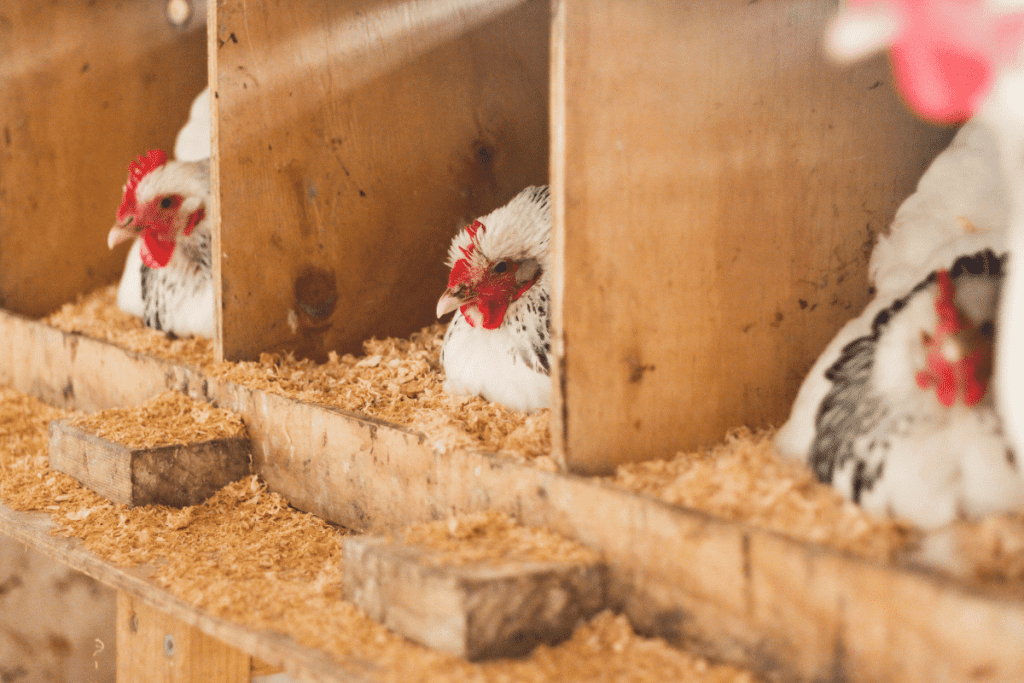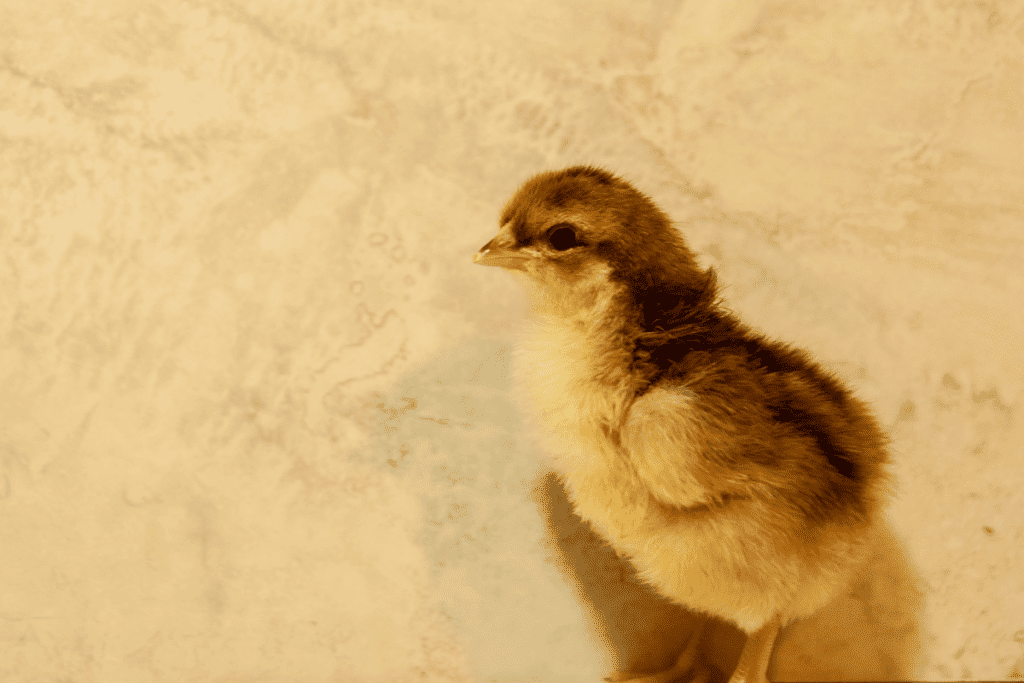There are many varieties of Sussex chickens to choose from.
But all of them are generally considered good egg layers with a wide range in their exact laying abilities.
Besides this, they’re mellow and well-loved among chicken keepers everywhere.
Considering adding some of these sweethearts to your family?
Read on to learn all there is to know about their laying habits and eggs before you bite the bullet and make a purchase.

Table of Contents
ToggleThe Basics of Sussex Chicken Eggs
Sussex chickens lay cream or light brown eggs varying in size from medium to large. The eggs will be a little different depending on the exact kind of Sussex bird you have. Sussex chickens are good layers, producing anywhere from 150-260 eggs yearly, depending on the specific variety of chicken.
The Sussex outlays more mediocre birds but is not the number one best layer in the world or anything.
She lays very well, producing eggs consistently throughout the year, and is a calm bird.
Sussex chickens are popular for several reasons:
- Docile and friendly temperament
- Strong layers
- Beautiful plumage
All these things play in their favor and make them extremely likable birds.
As for their lovely appearances, the Speckled Sussex is, in my opinion, one of the most beautiful chickens out there.
Their feather pattern is so adorable!
But the other feather colors of Sussex birds are lovely too.
Their ability to lay reliably and get along well with the other birds in the coop is very important, though, and the Sussex is great for these things too!
When Do Sussex Chickens Start Laying?
Sussex chickens sometimes start laying as early as 16 weeks (about four months). Sometimes, though, they take longer; again, this could depend on the specific variety of Sussex you have in your coop.
As with many common chicken breeds, don’t worry if they take a little longer than you were anticipating before they start laying eggs.
It’s natural for some birds to take a little bit of extra time.
How Long Do Light Sussex Chickens Lay For?
Estimates vary on exactly how long your Sussex chickens will keep laying. One and a half years is the lowest guess out there. Many poultry enthusiasts have had Sussex birds lay for two or three years before they started slowing down.
Light Sussex chickens lay for about as long as any other Sussex bird.
If you want your birds to lay for as long as possible, take good care of them.
They’ll only give you as much as you give them!
What Color Eggs Do Sussex Chickens Lay?
Sussex chickens lay light brown- and cream-colored eggs. The color changes depending on the variety of the bird. Their eggs also vary in size from medium to large.
We’ll include a chart later on, to show you which type of Sussex birds lay which eggs.
Are Sussex Chickens Good Layers?
Sussex chickens are an excellent choice for anyone looking for a friendly breed capable of laying and hatching eggs. They lay 3-5 eggs per week, and their egg production stays up provided you give them consistent access to food and clean water.
They don’t lay as many eggs as a Rhode Island Red. However, their mellow disposition is preferable to the assertive nature of Rhode Island Reds.
Related: Rhode Island Red Eggs Questions and Answers
Also, their egg production is not too far behind!
Do Sussex Chickens Go Broody?
While other poultry breeds are considered broodier, the Sussex goes broody from time to time. The Light Sussex, some say, is less broody than other varieties of Sussex.
Most Sussex chickens are believed to make good mothers due to their gentle disposition and penchant for broodiness.
Sussex Roosters
Baby chickens and small children are generally considered safer when no roosters are around.
However, Sussex roosters are astonishingly gentle but assertive chickens.
Compared with other varieties of poultry, male Sussex are easily some of the friendliest!
If you’re a backyard poultry keeper who wants to raise a rooster but has been afraid of aggression issues, the Sussex rooster is the perfect choice!
Further reading: Do Sussex chickens go broody?
How Long Do Sussex Chicks Take to Hatch?

The average hatch time for most chicken breeds is 21 days, and Sussex birds are no exception. Baby chicks usually hatch at around 21 days and only occasionally take a few days longer.
Give those adorable chicks their time in an incubator, or have your broody Sussex hen sit on them for three weeks, and they should be ready to hatch.
Fertile chicken eggs usually don’t take more than 28 days to hatch, maximum.
While some breeds of chicken take more than 28 days, Sussex chicken eggs are likely infertile if they haven’t hatched by then.
Speckled Sussex Chicks Appearance
Baby Sussex chicks don’t look like their chicken parents right away!
Speckled Sussex have no ‘speckles’ when they are first born.
Their down is light brown, and some of it is darker than the rest.
Don’t expect those fancy markings to appear on your birdies when fresh out of the egg.
The speckled appearance of Sussex chickens doesn’t show up until the birds are five or six weeks old.
What’s exciting about these birdies is how their pattern seems to deepen the longer they are alive.
Even once they mature, their feather pattern continues to become more defined!
Increasing Egg Production
Hens sometimes develop deficiencies in calcium or other nutrients, especially as they age. Remedying these deficiencies often helps with egg production and quality. Giving your birds adequate light, food, and water is crucial to high production.
If your Sussex chickens aren’t laying as many eggs as usual or as many as they should be capable of, there are a few things to consider doing.
Remember, your birds won’t lay at the same rate their whole lives.
If you’ve had your Sussex hens for at least two years and have noticed they aren’t laying as well as they used to, it’s probably because they are getting older.
It is natural and healthy for your chickens to lay fewer and fewer eggs as they age.
Many chicken breeds will stop laying completely by the time they are 4-5 years old.
Sussex chickens are said to slow down between 2 and 3 years old and stop laying soon after.
Meanwhile, they can live up to 8 years.
Do Sussex Chickens Lay in Winter?
Sussex chickens are hardy fowl and keep laying in the winter months! The wide variety of Sussex all do well in colder weather. They’re a perfect choice for beginners and those keeping chickens for eggs in the North because of their hardiness.
Remember, any bird needs some basic aid to keep laying the maximum number of eggs they can lay.
In winter, you must ensure they have the usual access to plenty of food and clean water.
But you also have to provide artificial light to compensate for the shorter days we see in the colder months.
If your birds don’t have enough light and the nighttime lasts too long, their bodies have difficulty producing eggs at the usual rate.
Laying Habits of Different Sussex Varieties
We’ve given you a lot of information generalized to Sussex chickens as a whole.
However, the laying abilities of each type of Sussex chicken are different.
While there isn’t a huge change in egg color, size, or production across the separate Sussex chickens, there is some variation.
| Buff Sussex | Other Sussex | Speckled Sussex | Coronation Sussex | |
|---|---|---|---|---|
| Eggs per year | 200-260 | 150-240 | 180-250 | 200-240 |
| Egg color/size | Cream, Medium to Large | Cream/Light Brown, Medium to Large | Light Brown, Large | Cream, Medium |
More on Sussex Chickens
If you like what you’re hearing, you’re probably feeling pretty tempted to purchase some Sussex birds.
But before you do, let’s talk details.
These birdies are excellent foragers and love to explore.
Many other chickens are the same way, so if you are already a backyard poultry farmer, the odds are that you already have room for your birds to roam.
If you don’t, you need to make some before getting Sussex chickens.
The next thing you need to do is decide exactly what kind of Sussex you want to add to your coop!
The ones with the most distinctive markings are the Speckled Sussex, which has small white markings on dark feathers.
However, Buff Sussex has the potential to lay a higher quantity of eggs.
Depending on exactly what you’re looking for, it may be a good idea to get all kinds of Sussex birds.
They are all good layers and a tough breed of chicken.
So, you aren’t likely to have problems no matter which variety you get.
Just make sure you purchase your birds, as always, from reputable breeders!
How useful was this post?
Click on a star to rate it!
We are sorry that this post was not useful for you!
Let us improve this post!
Tell us how we can improve this post?
